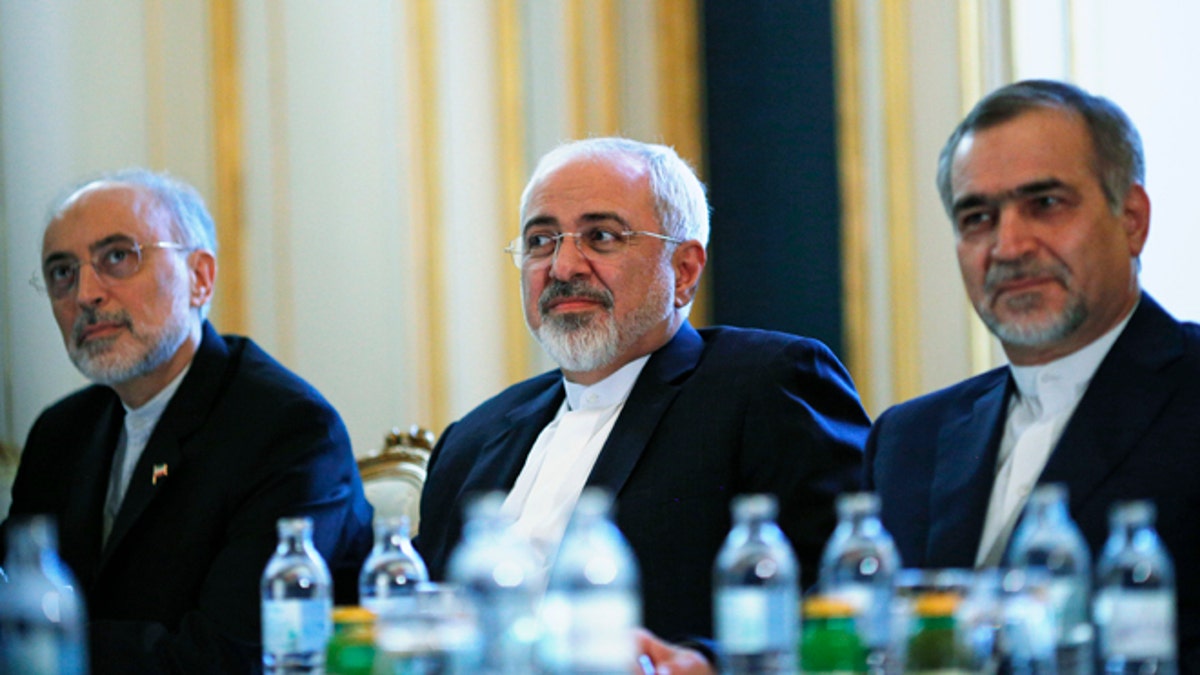
July 3, 2015: Iranian Foreign Minister Mohammad Javad Zarif, centre, Head of the Iranian Atomic Energy Organization Ali Akbar Salehi, left, and Hossein Fereydoon, brother and close aide to President Hassan Rouhani, meet with U.S. Secretary of State John Kerry in Vienna, Austria. (Carlos Barria/Pool via AP)
Iranian Foreign Minister Javad Zarif urged world powers in a video message Friday to stop the “coercion and pressure” at the nuclear talks, suggesting a favorable agreement could open the door to cooperation on fighting extremism in the Middle East.
Though Zarif didn’t mention the U.S. by name, the seemingly bilateral talks between the two sides make his words clearly directed at the Americans, who have been the primary drivers of the crippling economic sanctions on Iran over its nuclear program.
Any deal would result in an end to the sanctions, but with the July 7 deadline approaching, talks remain bogged down.
The West fears Iran could develop its nuclear program to make weapons, while Iran has maintained the notion that it is only meant for peaceful purposes. Zarif called for an end to “unjust economic sanctions” and for the West to join in one common cause against “the growing menace of violent extremism and outright barbarism.”
A senior U.S. official declined to comment on anything further than the nuclear talks, the Wall Street Journal reported.
Secretary of State John Kerry and Zarif met again Friday, while U.S. Energy Secretary Ernest Moniz and the head of Iran’s atomic energy agency, Ali Akbar Salehi, held hourslong discussions. Kerry said the talks “are making progress.” But also said there is still “a lot of work to do.”
The Obama administration says that at least part of the sanctions relief for Iran under any pact will depend on Iran's full cooperation with the U.N's International Atomic Energy Agency to probe allegations that Tehran worked secretly on atomic weapons. But hopes of progress any time soon on that issue dimmed Friday.
The developments in negotiations come after Iran took a hard stance on its demands in the final accord Thursday. Iran rejected any extraordinary inspection rules and warned that if the U.S. and any other countries re-impose sanctions after the deal is done, it would ramp up enrichment of bomb-making materials.
The hard line came as the head of the IAEA, Yukiya Amano, visited Tehran Thursday to deal with the issues surrounding the deal and to seek “clarification” of possible military dimensions of programs, the journal reported.
Amano said in a statement Friday he believes that both sides are moving forward to an agreement. He also discussed with Iran the agency’s role in verifying the nuclear agreement, the journal reported.
Armano has repeatedly called on Iran to step up cooperation after only addressing two of the 12 sets the agency had a problem with. Iran has committed to implementing the IAEA's "additional protocol" for inspections and monitoring as part of an accord. The protocol gives the IAEA expanded access to declared and potentially undeclared nuclear sites, and to the sensitive information of the more than 120 governments that accept its provisions.
Speaking to reporters in Austria's capital Thursday a senior Iranian official said the IAEA's standard rules governing access to government information, sites of interest and scientists should be sufficient to ensure that his country's program is peaceful.
The rules don't guarantee monitors can enter any facility they want to and offer no specific guidance about sensitive military sites — an issue of particular interest with Iran, given the long-standing allegations of secret nuclear weapons work.
The Associated Press contributed to this report




